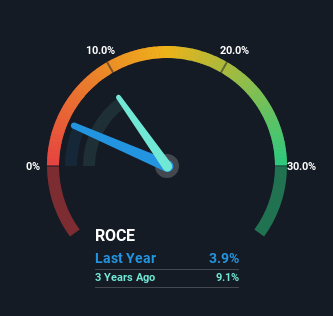- Taiwan
- /
- Semiconductors
- /
- TWSE:2481
Some Investors May Be Worried About Panjit International's (TWSE:2481) Returns On Capital

Finding a business that has the potential to grow substantially is not easy, but it is possible if we look at a few key financial metrics. Ideally, a business will show two trends; firstly a growing return on capital employed (ROCE) and secondly, an increasing amount of capital employed. Ultimately, this demonstrates that it's a business that is reinvesting profits at increasing rates of return. Although, when we looked at Panjit International (TWSE:2481), it didn't seem to tick all of these boxes.
What Is Return On Capital Employed (ROCE)?
For those that aren't sure what ROCE is, it measures the amount of pre-tax profits a company can generate from the capital employed in its business. To calculate this metric for Panjit International, this is the formula:
Return on Capital Employed = Earnings Before Interest and Tax (EBIT) ÷ (Total Assets - Current Liabilities)
0.039 = NT$823m ÷ (NT$29b - NT$8.0b) (Based on the trailing twelve months to March 2024).
Thus, Panjit International has an ROCE of 3.9%. In absolute terms, that's a low return and it also under-performs the Semiconductor industry average of 8.0%.
View our latest analysis for Panjit International

In the above chart we have measured Panjit International's prior ROCE against its prior performance, but the future is arguably more important. If you're interested, you can view the analysts predictions in our free analyst report for Panjit International .
What The Trend Of ROCE Can Tell Us
We weren't thrilled with the trend because Panjit International's ROCE has reduced by 46% over the last five years, while the business employed 91% more capital. However, some of the increase in capital employed could be attributed to the recent capital raising that's been completed prior to their latest reporting period, so keep that in mind when looking at the ROCE decrease. The funds raised likely haven't been put to work yet so it's worth watching what happens in the future with Panjit International's earnings and if they change as a result from the capital raise.
In Conclusion...
Bringing it all together, while we're somewhat encouraged by Panjit International's reinvestment in its own business, we're aware that returns are shrinking. Yet to long term shareholders the stock has gifted them an incredible 157% return in the last five years, so the market appears to be rosy about its future. Ultimately, if the underlying trends persist, we wouldn't hold our breath on it being a multi-bagger going forward.
One more thing to note, we've identified 2 warning signs with Panjit International and understanding these should be part of your investment process.
For those who like to invest in solid companies, check out this free list of companies with solid balance sheets and high returns on equity.
New: Manage All Your Stock Portfolios in One Place
We've created the ultimate portfolio companion for stock investors, and it's free.
• Connect an unlimited number of Portfolios and see your total in one currency
• Be alerted to new Warning Signs or Risks via email or mobile
• Track the Fair Value of your stocks
Have feedback on this article? Concerned about the content? Get in touch with us directly. Alternatively, email editorial-team (at) simplywallst.com.
This article by Simply Wall St is general in nature. We provide commentary based on historical data and analyst forecasts only using an unbiased methodology and our articles are not intended to be financial advice. It does not constitute a recommendation to buy or sell any stock, and does not take account of your objectives, or your financial situation. We aim to bring you long-term focused analysis driven by fundamental data. Note that our analysis may not factor in the latest price-sensitive company announcements or qualitative material. Simply Wall St has no position in any stocks mentioned.
Have feedback on this article? Concerned about the content? Get in touch with us directly. Alternatively, email editorial-team@simplywallst.com
About TWSE:2481
Panjit International
PANJIT INTERNATIONAL INC. manufactures, processes, assembles, imports, and exports semiconductors in Taiwan, China, Korea, the United States, Japan, Germany, Italy, and internationally.
Very undervalued with excellent balance sheet.
Market Insights
Community Narratives




